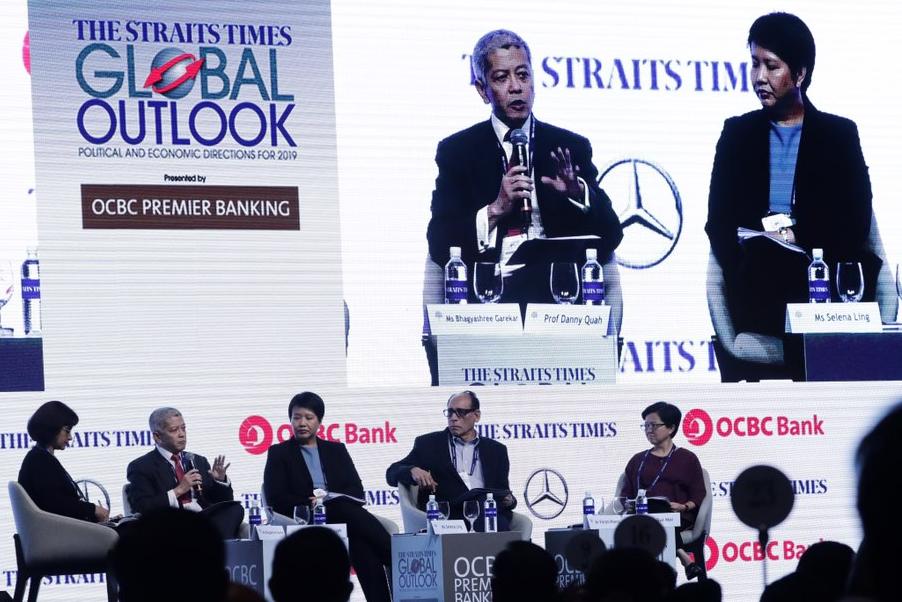ST Global Outlook Forum: US-China tensions not about trade, but leadership and dominance
Sign up now: Get ST's newsletters delivered to your inbox

(From left) Ms Bhagyashree Garekar, Deputy Foreign Editor, ST, Professor Danny Quah, Dean and Li Ka Shing Professor in Economics, Lee Kuan Yew School of Public Policy, National University of Singapore, Ms Selena Ling, Head of Treasury Research & Strategy and Member of OCBC Wealth Panel, OCBC Bank, Mr Vikram Khanna, Associate Editor, ST and Ms Goh Sui Noi, East Asia Editor, ST, during the panel discussion at The Straits Times Global Outlook 2019.
ST PHOTO: KELVIN CHNG
Seow Bei Yi
Follow topic:
SINGAPORE - Global trade cannot be the cause of the rising disaffection that has fuelled tensions between the United States and China - given that sentiment against foreigners and inequality is also seen in countries where patterns of trade have not shifted dramatically.
This is why panellists at The Straits Times Global Outlook forum believe that the US-China trade war is instead about strategic leadership and political presence in the world.
On Wednesday (Nov 28), Professor Danny Quah of the Lee Kuan Yew School of Public Policy noted that the world has become more equal in recent years, with millions of Chinese moved out of extreme poverty and emerging nations achieving parity with the developed world.
Prof Quah, one of four panellists discussing the trade war at the event in Raffles City Convention Centre, suggested that resolving the US-China conflict goes beyond fixing public policy and resolving issues of inequality. He laid out possible interpretations of the reasons behind it, adding that none of these add to positive outcomes.
One possibility, he said, is that "America cannot tolerate a different country being potentially number one in the world, and China is on a trajectory that will take it to overtaking the US".
"It is now China that is telling that story of inclusiveness, openness, multilateralism," he added. "This trade war will continue because we have not been able to disentangle its root cause... we may have to prepare for a different kind of international system (in the longer term)."
OCBC bank's head of treasury research and strategy Selena Ling agreed that the trade war will not end anytime soon.
"Politics drive economic policies, and we see this manifestation very clearly in the trade war," she said. "There are short-term winners and losers... (but) if you have two giants in the room, US and China, in this really prolonged, protracted fight, it's just going to complicate things for the rest of Asean."
Pointing to agreements such as the Comprehensive and Progressive Agreement for Trans-Pacific Partnership, as well as the Regional Comprehensive Economic Partnership, Ms Ling added: "In the short term, we've seen Asean really try and get its act together, in terms of pushing ahead with integration."
But the outlook is more uncertain in the long run, she said, because if the US bans all electronic export components to China for example, it would not just be corporations that would face trouble. Instead, the consumer will see product prices rise, given that value chains will be repriced, she said.
Ms Ling added that China has a "difficult balancing act" as it has various mandates such as sustaining growth, containing inflation and maintaining currency stability. She noted that the road ahead is likely to be painful for the Chinese economy.
The Straits Times' Associate Editor Vikram Khanna flagged pressures that China is facing also, saying that China's position is not as strong as its leaders are trying to project.
Earlier this year, Chinese telecom company ZTE almost collapsed after the US imposed a ban on the sale of American technologies to it, he said.
"That really brought home to us, and to a lot of Chinese, that China still highly dependent on the US and other advanced economies for very critical things like chips. China imports 90 per cent of its semiconductors," he added.
He also said time is not on China's side, estimating that it has a 10- to 15-year window before its other social problems become more serious. For example, 25 per cent of its population is expected to be over the age of 60 in 2030.
"The longer this gets drawn out, the weaker China's position could become," he said.
But Ms Goh Sui Noi, East Asia Editor at The Straits Times, said some intellectuals and economists believe the trade war could spur reforms in China, even as things may get worse in the short term. This includes changes to subsidies that state-owned firms receive, which distort the market not just for foreign firms but the Chinese private sector as well.
Meanwhile, Mr Khanna remains circumspect as well about the benefits that Asean could reap from the global situation.
"A lot of economists, especially in Singapore, seem to think that Asean could be a great beneficiary of the trade war between the US and China," said Mr Khanna. "It is true that there will be some value chains that shift out of China. They probably would have shifted anyway, especially at the lower end, the labour-intensive end, to countries like Vietnam and Indonesia."
This, however, may not be the case for higher-end value chains, which are harder to dislodge given that they require a more highly-skilled workforce.
There is also a shift to automation in more labour-intensive industries, meaning the beneficiaries will be parties who own the technology, and this tends to be controlled by a few countries such as China, Japan, Korea, the US and Germany.
"We will qualify the extent to which Asean stands to benefit from the shift in supply chains from China," he said.

